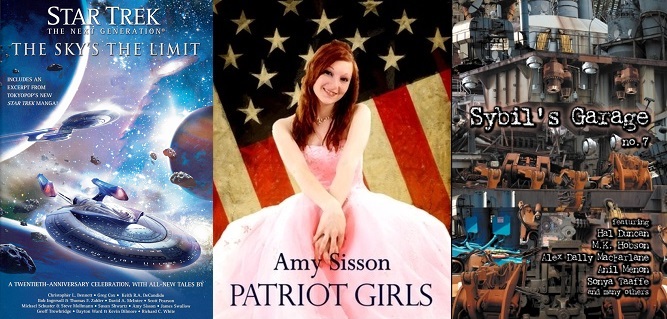I feel as though I've done my short story reading a disservice this month; it's been more fragmented than usual, and I've had to play catch-up a couple of times. On a more positive note, I've started in on award reading in earnest -- you can see from the list of stories below that I've mainly been reading works published in 2015, so I can be ready to nominate and vote for the Hugos, Nebulas, and World Fantasy Awards next year. I'm also entering into the home stretch of my read-a-story-a-day goal. Of course, we all know how busy December is, but I think I can do it!
(For those who are interested, you can see a public "Nebula Suggested Reading List" from the SFWA, or the Science Fiction and Fantasy Writers of America. These aren't nominations at this point, just suggestions, but it's fun to see what works have begun percolating up to the top in each category. You can also sort the lists by author or publisher if you prefer.)
In any case, here are two stories that stood out for me among those I read in November:
"Recipe: 1 Universe" by Effie Seiberg
List format stories are becoming a harder sell for me as I read more of them, but this one completely charmed me. It's exactly as advertised, a recipe for creating a universe. It's full of warmth and humor and lovely imagery. It's available in the September 2015 issue of Galaxy's Edge magazine, which can be purchased here. I believe it will also soon be available on the author's website. (Update: free link to story on author's site here.)
"Experience Arcade" by James Van Pelt
Here's a flash story from Daily Science Fiction that I wish I'd read in time for my Halloween post several weeks ago, because it really nails the dark, creepy atmosphere that I look for in a horror story. And it does so by questioning what attracts people to horror in the first place, and what might happen if watching horror movies somehow was no longer enough.
In a way, it's odd that I liked this story so well, because although I definitely like dark films, I don't like traditional horror films at all. When I was a kid I watched Friday the 13th and A Nightmare on Elm Street to go along with the crowd. In fact, a group of us used to see Nightmare on Friday and Saturday nights at the midnight movies, where we would MST3K it. But ultimately I started having Freddy Krueger nightmares, and then I had a nightmare about the Chucky doll even though I'd never seen any of those movies, so I stopped watching horror films altogether. (Seriously, who gets nightmares from previews?!) Even The Sixth Sense, which I think was brilliant, was almost too scary for me, because I hate being startled by things jumping out or appearing suddenly from behind.
But back to this story: what appealed to me was the narrator's mixture of despair mixed with cynicism. I highly recommend this short story, which is available at Daily Science Fiction here.
Other stories read in November 2015:
(alphabetical by author)
- "No Spaceships Go" by Annie Bellet (2010)
- "Honk if You Love Jesus" by R.L. Black (year unknown)
- "Checkmate Charlie" by Gustavo Bondoni (2015)
- "Forgiveness" by Leah Cypress (2015)
- "Fishing Lures" by G.L. Dearman (2015)
- "Nine Ways to Communicate with the Living" by Sarina Dorie (2015)
- "Fathers' Faces" by Robin Wyatt Dunn (2015)
- "Nakamura-san" by Robin Wyatt Dunn (2015)
- "Lirazel's Heart" by Robert B. Finegold (2015)
- "Sea Monkey Business" by Paul A. Freeman (2015)
- "The Broken Doll" by Robert Green (2015)
- "Schrödinger's Schrödinger" by Benjamin Jacobson (2015)
- "A Brief History of the New Brighton Toy Poodle" by Lex Joy (2015)
- "Here is My Thinking on a Situation That Affects Us All" by Rahul Kanakia (2015)
- "Junk Dreams" by Damien Krsteski (2015)
- "Last" by Rich Larson (2012)
- "The Word of Unbinding" by Ursula K. Le Guin (1974)
- "Spellcasting" by Gerri Leen (2015)
- "Lady of the Skulls" by Patricia A. McKillip (original 1993; reprint 2010)
- "Lilly" by Melissa Mead (2015)
- "To Fall, and Pause, and Fall" by Lisa Nohealani Morton (2015)
- "Rain Like Diamonds" by Wendy Nikel (2015)
- "The Last of Time" by Ken Poyner (2015)
- "Silent Familiar" by Cat Rambo (original 2009; reprint 2015)
- "Charlie" by Carla Richards (2015)
- "Loving Grace" by Erica L. Satifka (2015)
- "The Maker's Mark" by Mark Silcox (2015)
- "Giraffe Cyborg Cleans House!" by Matthew Sanborn Smith (2015)
- "The Plausibility of Dragons" by Kenneth Schneyer (2015)
- "My Wife is a Bear in the Morning" by David Steffen (2015)
- "Looking for Nanna" by Gerald Warfield (2015)
- "Noise Pollution" by Alison Wilgus (2015)
- "Rock, Paper, Scissors, Love, Death" by Caroline M. Yoachim (2015)
List of the sources from which these stories came:
(alphabetical by anthology title, magazine title, website name, etc.)
- Ain't Superstitious (anthology), edited by Juliana Rew, September 2015
- Asimov's, February 2015
- Clarkesworld, September 2015
- Daily Science Fiction, various dates
- Diabolical Plots, November 2015
- Epic: Legends of Fantasy (anthology), edited by John Joseph Adams, 2012
- Every Day Fiction, various dates
- Fireside, February 2015
- Freeze Frame Fiction: v2 flash fiction: YA, year unknown
- Lightspeed, November 2015
- Perihelion, October 2015
- Podcastle, November 2015
- A Quiet Shelter There (anthology), edited by Gerri Leen, September 2015
- Robotica (anthology), edited by Elizabeth Hirst, October 2015
- The Secret History of Fantasy (anthology), edited by Peter S. Beagle, 2010
- Strange Horizons, April 2015
Read more!









